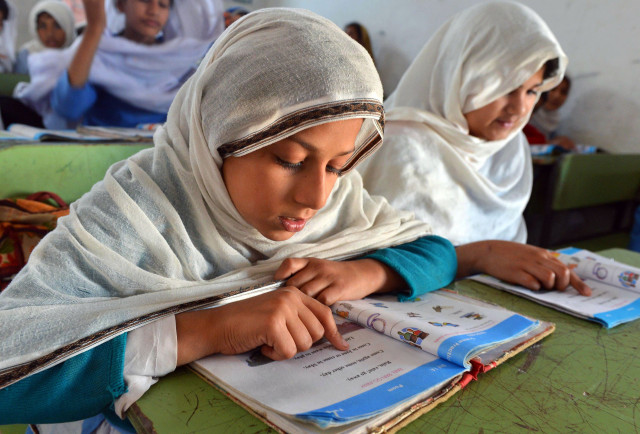Backseat no more; education finance increasing in budget
Combined budget has increased significantly by 27% since 2013-14

Combined budget has increased significantly by 27% since 2013-14. PHOTO: PAKISTANTODAY
In this year’s budget, a total of Rs734 billion had been allocated for education, which presents an increase of 15% compared with the previous year’s allocated budget. In the last three years, the combined education budget for the federal government and provinces has increased significantly by 27%, from Rs580 billion in 2013-14 to Rs734 billion in 2015-16.
The educational challenge faced by Pakistan can be dubbed enormous to say the least with around 25 million children out of schools, literacy rate hovering around 58%, huge number of schools without basic facilities and poor learning outcomes of those enrolled.
Ensuring inclusive and equitable quality education and promoting lifelong learning opportunities for all would come at a cost; a cost that at the moment is quite high to be borne by the government alone. However, it is commendable that the government has prioritised education and is spending significant resources in this regard.
The Incheon declaration at the World Education Forum (WEF) 2015 in Republic of Korea urges the governments to allocate at least 4-6% of their GDP and at least 15-20% of the total public expenditure on education. Education is a provincial subject in Pakistan and therefore, a look at the provincial budgets would give us an idea of the financial commitment of government for education.
Provincial divide of education
Referring to the provincial budgets only, a combined budget of Rs636 billion has been earmarked for education in 2015-16 which is Rs84 billion (15%) more than the allocation in 2014-15. Looking at the education budget 2015-16, Pakistan allocated 22% of its Rs2, 918 billion budget (all provinces combined) for education which is higher than the recommended percentage in the Declaration.
However, there is a need to increase the size of education budget compared with GDP which currently stands at 2.1% in Pakistan; the lowest in South Asia. This would only be possible through tax reforms like expanding the tax base and ending harmful tax incentives.
In the budget 2015-16, the highest share of education in provincial budget has been recorded for Khyber-Pakhtunkhwa which allocated 25% of its total budget of Rs488 billion for education. The other three provinces are also investing significantly in education with 21% share for Sindh and Punjab and 20% for Balochistan.
However, despite the fact that the resource envelop of all the provinces has grown in the last few years and subsequently the education budgets have also increased in real terms, the percentage share of education in the total provincial budget has gradually decreased for the provinces in the last three years except for Balochistan.
Pakistan is investing significantly on education as is evident from the above analysis. However, despite the commitment, there is still a long way to ensure inclusive, equitable and quality education opportunities for all children in the country.
The educational challenge faced by Pakistan is not only limited to the lack of budget but is significantly linked with the way financial resources are allocated, spent and monitored.
Efforts are being made to improve the effectiveness of available financial resources in order to contribute towards better learning outcomes and quality of education. It is hoped that such sustained efforts would help in effectively responding to the challenges faced by public education sector in Pakistan.
The writer is a research fellow at Institute of Social and Policy Sciences (I-SAPS) Islamabad
Published in The Express Tribune, August 24th, 2015.
Like Business on Facebook, follow @TribuneBiz on Twitter to stay informed and join in the conversation.



















COMMENTS
Comments are moderated and generally will be posted if they are on-topic and not abusive.
For more information, please see our Comments FAQ